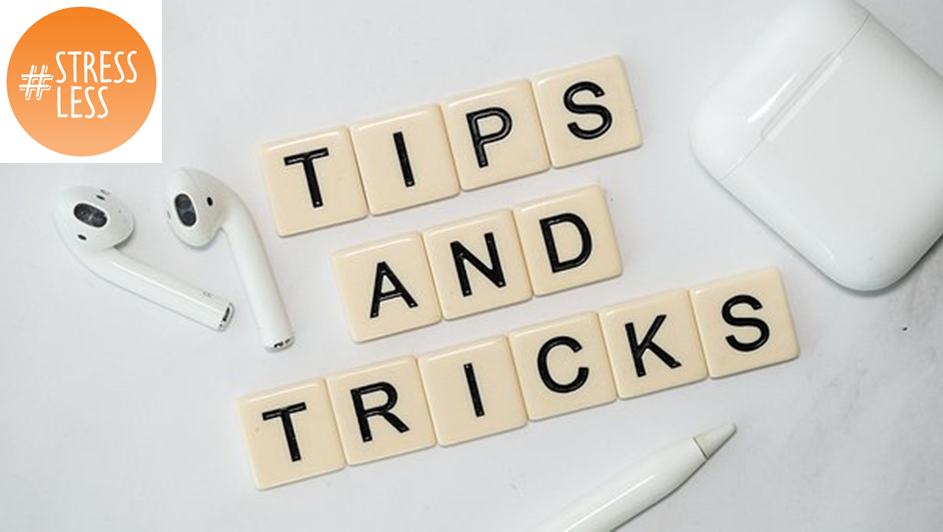During the Autumn/Winter stressless of 20/21 we ran a competition asking for your top tips when it came to exams and assignments. We had some great suggestions from preparation to revision, from study spaces to keeping calm. So here they are, maybe you will find something to try yourself next time around.
Preparation
The great thing about being prepared and thinking/planning ahead is that it really helps to deal with personal demons such as anxiety and stress. This enables you to put your focus on the work ahead and gives you the opportunity to develop new skills and knowledge that may help to improve what you are working on.
In addition to scheduling my weeks ahead, I also add aims for my meetings (eg. discussion points/resources) and preparation (is there any revision/research I can do beforehand?). I also add links directly to my resources so I don’t get distracted by other outstanding items
Have a colour coded highlight system, I use yellow for anything of interest for an assignment; purple for references; blue for anything I want to find out more about; green for notes for future practice and red for words I don’t understand so need to Google!
Use Youtube to get your base understanding of topics
Plan ahead and know when my exam is or deadlines are
Planning and getting ready is really important, it’s hard with timetables changing, but plan plan plan
Plan out your study time on a Sunday evening and plan it with your phone calendar. Make sure you schedule some down time too
Using Outlook Calendar for organisation
Colour code
Prepare your environment
Make sure you have everything to hand so that you can focus on your work with no distractions
Get ahead, and stay ahead. Know what’s expected of you, read the assessment briefs and know how you will be assessed and work towards these as targets. Set realistic expectations – don’t expect to leave it to the last minute and be able to power through. Learn in a way that works for you eg. reading, watching videos
The best thing for those living and studying in halls or shared accommodation is to make sure that not only your desk is clear and tidy, but that your room is too. If you make your bed every morning you, (1) Get to end the day in a nice environment. (2) You get a sense of achievement which will set you up for the day knowing that at least you achieved one thing that day. (3) You risk less distraction from mess. Also, by clearing away your study/revision notebooks, as well as your exercise books and reading materials, you keep the desk tidy for the next time you come to use it and by keeping them out of sight you’re more likely to keep things out of mind and therefore reduce stress and anxiety.

Note making and colour coding
Note taking is an extremely useful process to get into to help you prepare for whats ahead. But, you can get into the habit of writing down way more than you actually need too.
Check out the module on skills for study on ‘Reading and Note-taking‘ to get yourself started.
You could also visit the Learning Skills hub and try out the sections on ‘finding information‘ and ‘note-taking‘ for further support.

- Do not focus on colour coding until after you have finished taking down your notes.
- Don’t overthink the colour coding process, keep it simple.
- Use bright colours and identify a key for your coding.
- Use a pen with multi-colours built in to save time.
Assignments
Its important that you fully understand what is being asked through the assignment question and you have a clear vision of how you expect to answer. Its here when previous preparation can come into play and really help with the momentum of the assignment.
Take each assignment one by one. Start with the ones that are closest to be handed in. This will allow you to think clearly about the right assignment and get that done
Make a list of what each assignment should include, that way you know what needs to be included to get the best grades. Knowing this will allow you to be less stressed and you can get on with your assignments
Researching information
A key part of putting together an assignment is doing the research/gathering the information that you will use to help compose the answer to the assignment question. But how do you get started?
The Learning Skills hub has two modules to assist here ‘finding information‘ and ‘online research‘. It’s so important to understand how to find, evaluate and organise information that is vital to your answer, while removing all the extra filler.
You could also look up skills for study to explore the different ways you can research, to find out what methods are best for you; check out ‘research principles‘.
Writing assignments

- Check out these modules if you need any tips on writing assignments.
- Planning your assignment
- Writing your assignment
- Writing essays
- Other assignments –projects & dissertations
Referencing & Plagiarism
This is so important. We should always identify where we have obtained information from and acknowledge those that have originally written or recorded it. If we don’t account for this then we are plagiarising others work, which can have serious ethical ramifications.
To learn more visit ‘introduction to referencing‘ and ‘referencing and understanding plagiarism‘.
You can also check out cite them right by Richard Pears (Classmark 025.48 PEA) or visit Cite them Right online to find referencing help and advice.
Revision
We all have different likes and dislikes when it comes to doing our own revision; go with whatever works for you. If it helps you to remember, helps you to achieve your goals, then it is clearly beneficial.
My top revision tip for parents with young children, is to get your kids interested in the human body and to create little games that you can do with them about the body! Entertains the kids whilst also educating yourself!! double win!
There are various revision techniques including flashcards, past papers, mind maps, group work and recording yourself talking and playing it back
Work out which kind of note taking works for you, mind mapping, multi colours, post it notes, Cornell method or Skeleton method, fill up those note books but make sure you can find what you want at a later date
Review and rewrite notes you take right after the lecture while they are still fresh in your mind. This way you can elaborate and research while you still remember as opposed to trying to figure out what your notes are about right before the exam
Using mnemonics, symbols and writing index cards & mind maps. Reserving a bit of time everyday or every few days to revise or work on an assignment. Everyone is different, you have to find what works for you
Be organised, create a timetable to stick to but REMEMBER schedule in plenty of breaks where you can get a cup of tea and some fresh air! Don’t be too hard on yourself, if you notice you are distracted, your revision session isn’t ruined! And finally, find the revision method that suits you best, don’t compare to others
Also active recall activities are really useful too
Revise, revise, revise!
You might also be interested in checking out the following sites that provide additional tips about exams and revisions.
Young minds
Give a grad a go
Taking Breaks
It is so important to take breaks when studying and revising. There are so many benefits, that even short periods i.e. five minutes, could have an immensely positive outcome.
Take regular breaks when you need to. No longer than 5 minutes because that makes you not get back to what you’re doing as quick. Listen to music if that helps and use different colours for different things if that helps
Take regular breaks! Humans can only concentrate on a task fully for up to 30 mins. By taking breaks away from the work, eg. going to make a drink or stretching your legs, can allow the brain to refocus to ensure you can study to the best of your ability!
At home, set timers to use your phone/take breaks to ~30 mins so that you don’t have the urge to get distracted but still get your fix
Bring your favourite snacks, once you’ve eaten, you will be able to focus better
Keep hydrated, take little breaks in between working and always plan!
While studying make sure you set break, and do something that is not related to what you are studying. Leaving you with a clear mind for when you are studying
Get enough sleep
Use the Pomodoro technique to work in intervals and take regular breaks!
Some of these benefits could include;

- It gives your brain a rest
- The ability to reduce stress and improve your health
- It can improve your concentration and help your memory
- Enables you to maintain your focus and keeps performance high
What is the Pomodoro Technique?
you could use an old fashioned timer, the clock on your phone or a preset app/video, like the one below;
Online Resources
Using Newsfeed to collate my resources
Following my favourite blogs using RSS feed in Outlook
Check out this link to look at RSS feeds or watch the following video to learn more.
Using the Library
Don’t forget you find find plenty of information on the services and facilities that are available at our university libraries via the website.
If you’re the sort of person who is likely to chat to others or get otherwise distracted by music for example, I would definitely suggest using the silent zone/quiet zone. Everyone there is there with a mindset of hardcore studying and that definitely sways you and makes you more focused!
Go to the library if you need to work at a desk, or even from your bed if that’s what works for you
We use the various zones in the library to provide an area to meet various study requirements. What area best suites you?
Support
Having a WhatsApp group to message when stressed or need to ask a question
Get a study buddy it always helps to discuss things with someone else. Set a time for focused work then build in time for social sharing a cup of tea or something uplifting even if you can only do this virtually it helps gives each other support to get things done
All your fellow students are working towards the same goals, using similar methods and skills. Relying on each other for academic support, but also emotional, mental and social support can be extremely useful and beneficial for everyone.
But, don’t forget, you can find someone to talk to or get support from all over the university, for example lecturers, the support and wellbeing team and library team. We are here to help so do seek us out and get in touch.
Advice
Remember you are human, Rome wasn’t built in a day. A little at a time, scream, laugh and cry, if you need to. There is light at the end x
Listen to piano versions of sings you like while you write up your notes or essays. Less distracting than the TV but a lot better than silence. Plus the songs can get you psyched up and help you to keep working rather than burn out
Prioritise
Try and believe in myself
Be the best that I can be and do
Try not to stress, there is always another way. Sometimes it will not work though, but I know I have done the best I can
Know your habits well. If you know you function better in the afternoons, study in the afternoon. If you try to force yourself you will get stressed and not take anything in
Have no distractions whilst studying keeping phones away and focus mode on, a bit of music never fails to help, and considering i’m a creative student having multiple stationary to show your creatives and try not to overwork yourself, set time limits and word limits for each day (if its an essay) and proceed from there to be successful x

Thank you, to everyone that contributed your top tips. If you have anything else to suggest please drop it in the comments below. We hope you find something new and useful from the tips provided. Good luck with all exams and assignments.
References and Sources
Canterbury Christ Church University (2020) LearningSkillsHub. Available at: https://blogs.canterbury.ac.uk/ccculearningskills/ (Accessed: 2021).
Canterbury Christ Church University (2021) Library services for students. Available at: https://www.canterbury.ac.uk/current-students/library (Accessed: 2021).
Give a grad a go (2018/2021) 19 quick revision tips for students. Available at: https://www.giveagradago.com/news/2018/12/19-quick-revision-tips-for-students/367 (Accessed: 2021).
Macmillan (2021) Cite them right online. Available at: https://www.citethemrightonline.com/ (Accessed: 2021).
Macmillan (2021) Skills for Study. Available at: https://www.skillsforstudy.com/course-modules (Accessed: 2021).
Youngminds (2019/2021) All the revision and exam tips you’ll ever need. Available at: https://youngminds.org.uk/blog/all-the-revision-and-exam-tips-you-ll-ever-need/ (Accessed: 2021).
Youtube (2005/2021) Youtube. Available at: https://www.youtube.com/ (Accessed: 2021).
 Library
Library Jason Shirley
Jason Shirley 523
523






Comment on “Your top tips when it comes to exams and assignments”
Comments are closed.